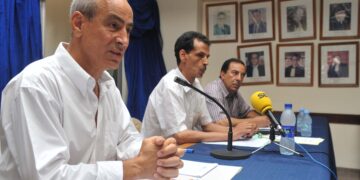Abusive "Crime Prevention Law" Allows Governors to Arbitrarily Detain People Without Judicial Charge or Evidence
(April 6, 2022, Washington D.C.) – The Jordanian government has turned to its abusive "Crime Prevention Law" as a new pretext to arrest at least 150 activists, journalists, teachers, former members of parliament, and previously detained Hirak activists in the past two weeks, said Democracy for the Arab World Now (DAWN).
The arrests appear tied to government efforts to avoid multiple protests planned against the government, including a sit-in against corruption, a commemoration for the March 2011 attacks on protesters, and a weekly teachers' union sit-in. Security forces have released all of those arrested shortly after thwarting their plans to protest.
"Mass arrests of activists before they even turn out to protest hardly inspires confidence in the Jordanian government's stability and self-confidence, much less its respect for the rights of citizens," said Sarah Leah Whitson, Executive Director of DAWN. "While President Biden attempts to rally the world against the scourge of dictatorships, its patron royal dictatorship in Jordan is relying on American support to 'preemptively' quash its citizens from expressing their opinions, a new low in governance."
It is unclear how the government is surveilling activists in Jordan and determining that they have plans to participate in protests. It does appear they are monitoring social media where some activists have called for protests. On April 5, Front Line Defenders and Citizen Lab released a new report documenting the Jordanian government's persistent use of NSO Group Spyware against human rights activists, lawyers and journalists in the country, including the infiltration of a phone as recently as December 5, 2021.
DAWN interviewed some of those arrested, as well as witnesses, family members and lawyers.
Major arrests commenced on March 24 to preempt a commemoration of the March 24, 2011 popular protests that resulted in the death of a protester. Those arrested that day include former members of Parliament Wasfi Rawashdeh from Shobak city in Ma'an Governorate and Ghazi Al-hawamleh from Tafilah Governorate; retired Major General Mohammad Otoum who had served in military intelligence; Teachers Syndicate leader Kefah abu Farhan; engineer and union activist Maisara Malas; and the leaders of the Partnership and Salvation Party, Khaled Hassanein and Ayman Sandouqa; journalist Ahmad Hassan Al-Zoubi; lawyer Mohamad Edhaimat; and an eighty-year-old Professor of Environmental Studies, Sufian Al-Tall, who also is the general coordinator of the "Change" Movement. While the government announced the names of many it had arrested, many more not named are reported to have been arrested as well.
Also among those arrested on March 24 was Anas al-Jamal, a Jordanian street vendor of Palestinian origin in Irbid well-known for leading chants at protests, to prevent him from going to the planned protest. Al-Jamal was at home when police arrived to arrest him. He is the sole caretaker for his mother and two young brothers. Al-Jamal is the only one of these men arrested who has not been released. He is facing felony charges, including under article 118 of the Jordan Penal Code for "harming Jordan's relations with other countries" on charges of disturbing relations with a friendly country in accordance with the Cybercrime Law. Activists on social media linked Al-Jamal's arrest to his tweet in which he attacked the trilateral meeting that took place last month in Sharm El-Sheikh, including Egyptian President Abdel Fattah El-Sisi, Abu Dhabi Crown Prince Mohammed bin Zayed, and Israeli Prime Minister Naftali Bennett, and for which he faces five years imprisonment.
"It is Orwellian that maintaining 'state relations' requires muting a street vendor," said Jamal Al-Tahat, consultant to DAWN. "And it is a sad example that the government in Jordan still uses its heaviest hand against a poor Jordanian who dares to call for reform and democracy."
Jordanian authorities resumed arrests on March 27, including Mohamad Rbaihat, Khalid Al-Harasis, Abdulah Akaileh, and Jehad Al-Soud, supporters of "the Unemployed Movement" in Tafilah, a town 300 kilometers south of Amman, by order of the governor, Torkey Akho Irshaideh. The men were arrested in front of the governorate building, where they and others had been holding a sit-in for 43 days to protest the lack of job opportunities; the purpose of the arrests was to prevent them from marching to Amman as part of their protest. He also ordered the arrest of 31 people from Eimah-Tafeileh on March 27 who had started a sit-in on February 14. All were released on March 28.
"Arresting activists for a short time, releasing them, and then re-arresting them again is a new tactic adopted by the Kingdom to create fear across the country, without instigating criticism of the government's policies," Al Tahat said. "Jordan's security services are playing whack-a-mole with citizens who day in and day out are seeking to protest, while the government seeks to evade criticism from its international benefactors."
Arrests of teachers to prevent them from participating in weekly Teachers' Syndicate protests at the Education Ministry in Amman started on March 29. The teachers have been protesting the government's broken pledges to increase salaries and its efforts to shut down the syndicate. Government security forces arrested Ala Abu Tarboush, a 50-year-old physics teacher and activist in the Teachers' Syndicate, established in 2010. Police arrested him while he was at home with his wife and children.
In addition, Jordanian police arrested Kefah Abu Farhan, 55, a computer science teacher and member of the dissolved Teachers' Syndicate council; Dr. Maen Maqabelh; Dr. Abed Anour Hazaimeh; and Husain Abu Al-Shaikh, a small business owner. All of them are from Baqa'a Camp, 20 kilometers north of Amman. The police also established a checkpoint on the road between Amman and Irbid, 80 kilometers north of Amman, to prevent teachers from reaching Amman for the sit-in.
Jordan's efforts to quash the Teachers Syndicate occurred in the wake of competition for international funding for "teacher's training" provided by the U.S. Agency for International Development (USAID). There has been a persistent pattern of royal family members establishing purported civil society organizations as vehicles to capture economic and development aid from foreign governments.
Queen Rania established the "Queen Rania Teacher Academy " in 2009 and created an exclusive "pre-service Teacher Education Professional Diploma" in 2016. While the Academy characterizes itself as a "non-governmental organization," it is in fact associated with the royal family and was audited according to government auditing standards. It received a renewed grant in 2019 of four years of funding for the teachers' training from USAID. The Academy also entered into an agreement with several Gulf States to provide exclusive certification for Jordanian teachers.
In 2019, the Teachers Syndicate protested this arrangement, and after months of standoff between the syndicate and the government, USAID decided in 2021 to transfer funds designated for teachers' training to the country's public universities. Queen Rania thereupon transferred control and ownership of the Queen Rania Academy to the University of Jordan, but the government's conflict with the Teachers Syndicate has persisted.
The former Human Rights Commissioner in the Jordanian National Center for Human Rights Dr. Musa Braizat condemned the preemptive arrests on his Facebook page on March 27: "Nothing saddens me more than to detain people upon their intention to protest peacefully… I was the one who assured the world that Jordan is a state of law…".
Earlier in the month on March 17, the Governor of Amman, Yasser Aladwan, had issued a secret order to rearrest previously detained Hirak activists when they appeared at the Amman Zahran police station to be released. Security forces brought the eleven Hirak activists detained on March 17 to Amman's Zahran police station, following a judicial order for their release in light of the expiration of the 30 day maximum for their pretrial detention. Security forces then took the men to the office of Amman Governor Aladwan, whereupon he ordered nine of the men rearrested. The men are still detained as of this writing.
"Whether it's the Cybercrime Law or the even more Kafkaesque 'Crime Prevention Law', which allows governors in Jordan to arrest anyone they decide 'may' commit a crime, the Jordanian government is always conjuring new ways to persecute citizens demanding reforms," said Sarah Leah Whitson.
Governor Aladwan gave no reason for the detention of the re-arrested Hirak activists under the so-called "administrative detention" provisions of the country's Crime Prevention Law; Article 3 allows governors in Jordan to detain anyone without being brought before a judge for up to one year if the governor deems in his sole discretion that a person may be a danger to the community. Governor Aladwan refused to allow a lawyer for the detainees who spoke to DAWN to make a copy of the decision to detain the men, and demanded an exorbitant bail of 200,000 Jordanian Dinars (US $283,000) to release them.
On March 28, a group of lawyers, including retired judge Loai Obaidat, decided to file a judicial complaint against Governor Al-Adwan. The lawyers group are volunteers regularly defending Hirak activists persecuted by the government.
"The rearrest of these men is motivated purely by the thin-skinned Jordanian government's vengeance because these activists dared to demand reform in the country," said Jamal Al-Tahat, consultant to DAWN. "The Jordanian people see this as clearly as the rest of the world does, as what little credibility this government had in the wake of evidence of massive corruption evaporates by the minute."
In the past six months, Jordan has arrested more than 200 activists, 132 of them on March 29, to prevent the teachers syndicate sit-in at the Ministry of Education Building, but prosecuted only nine Hirak reform activists in the country, as the Jordanian monarchy has reeled from revelations of corruption and secret assets of the King and his family hoarded abroad in the Pandora Papers and Credit Suisse leaks, as well as the alleged coup plot in the Kingdom led last year by the King's brother, Prince Hamzah.
This month, the government also detained two journalists, DAWN's Arabic media director, Taghreed Risheq, and Palestinian writer Daoud Kuttab, at the airport. The government has dismissed the complaint against Risheq and lifted the travel ban it had imposed against her.







































